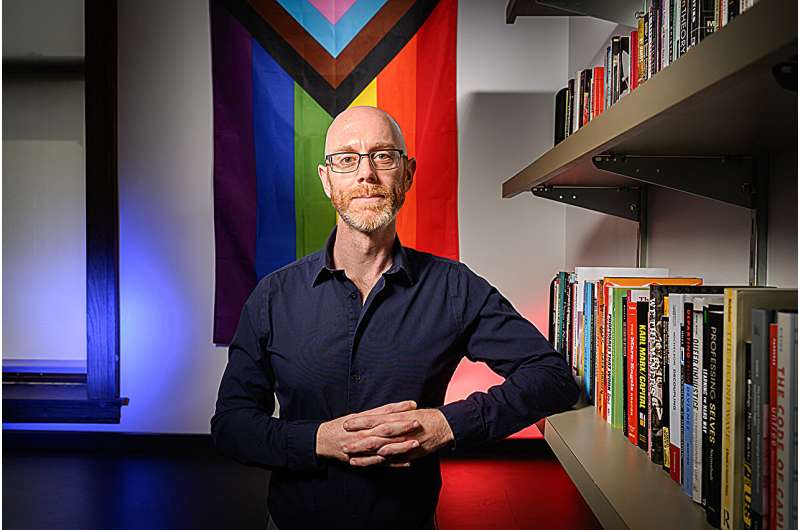This article has been reviewed according to Science X's editorial process and policies. Editors have highlighted the following attributes while ensuring the content's credibility:
fact-checked
trusted source
proofread
Q&A: Researcher investigates how LGBTQ people are treated by law enforcement

June is Pride Month, which commemorates the 1969 Stonewall Inn uprisings in Manhattan that brought the civil rights of LGBTQ+ people to the fore.
Stefan Vogler, a professor of sociology at the University of Illinois Urbana-Champaign, is a co-author of a new American Civil Liberties Union research report, "Policing Progress: Findings from a National Survey of LGBTQ+ People's Experience with Law Enforcement." He spoke with research editor Sharita Forrest about the findings.
What was the impetus for this report?
We wanted to do this report and the whole Policing the Rainbow Project—a landmark study of LGBTQ+-police relations—because we felt that LGBTQ+ people, gender, and sexuality more broadly were missing from the national conversation on policing.
That was important because there's a long history of a contentious relationship between LGBTQ+ people and the police. If we go back to the early or the mid-20th century, there were routinely raids on gay bars and places where gay people congregated; laws against cross-dressing or wearing clothes of the, quote-unquote, opposite sex; as well and as prohibitions on gay people gathering in public places together, touching or dancing together. The 1969 Stonewall uprisings were in direct response to police violence against the LGBTQ+ community.
Police departments recognized this and tried to improve relationships with the LGBTQ+ community through various avenues—creating sensitivity trainings, and LGBTQ+ liaison officer positions and doing more outreach with the LGBTQ+ communities.
But based on the existing research on LGBTQ+-police relations, it seems as though they still are very much at odds with each other.
When we think about policing, race has been central, as it should be, but there are many ways that gender, sexuality and LGBTQ+ identities come into play in policing. We wanted to see what was really going on from a holistic social science perspective.
In what ways do the experiences of LGBTQ+ people with the police differ from those of heterosexual individuals?
LGBTQ+ people have more contact with the police, whether that's requesting aid, reporting something or having involuntary, police-initiated contact.
They are more likely to be stopped by the police, to be searched, arrested or held in custody. All these forms of police contact are more common among LGBTQ+ people than non-LGBTQ+ people. This is especially true for transgender people. Nearly a third had police-initiated contact in the past 12 months compared with only 14.6% of non-LGBTQ+ people.
The content of these experiences and interactions differs as well. LGBTQ+ people are more likely to have physical force and insulting language used against them by the police, although this varies by sexual and gender identity. Whereas 12.3% of lesbian and gay respondents reported police using insulting language, more than 25.4% of bisexual people and 26.8% of queer+ respondents reported it. Rates were even higher among transgender (44.9%) and nonbinary+ (33.1%) individuals.
These differences are even starker when we consider race and socioeconomic status. LGBTQ+ people of color and of low socioeconomic status have even higher rates of contact with and mistreatment by the police in almost all the measures that we looked at.
Unsurprisingly, LGBTQ+ people are less likely to find their interactions with the police to be fair and just. They perceive the police as a less effective institution than non-LGBTQ+ people do. And as a result, they're ultimately less willing to contact the police in the future than non-LGBTQ+ people.
Your report indicated that 300 bills had been introduced in the past year across the US that involve criminalization of LGBTQ+ people, such as banning drag shows or gender-affirming medical care. How is this frenzy of legislation affecting LGBTQ+ individuals' interactions with law enforcement?
We did in-depth interviews with a subset of survey respondents, and one of our trans interviewees put it starkly. They said if the police are charged with upholding a law that goes against who I am as a person, then of course I'm not going to trust the police.
When the police are charged with upholding laws that fundamentally go against LGBTQ+ people and communities, it's really no surprise that they are distrustful of the police. That really crystallizes what we're doing in this report.
LGBTQ+ people are disproportionately affected by homelessness, which means that they are going to be even more exposed to policing. New bills are being passed that criminalize sleeping in public spaces in some cities or erecting tents.
We need to look at other laws that criminalize HIV status and consensual sex work, which often disproportionately affect other already marginalized groups.
What would you most like people to draw from this research?
At the broadest level, I would like people to understand that gender and sexuality are important social factors in policing and in determining how people are treated by the police and the broader criminal-legal system. LGBTQ+ and gender identity are important things to consider when we think about policing in America.
The LGBTQ+ community is a remarkably diverse community, and we're affected by policing differently along these various axes of social differentiation, whether that's gender or sexual identity, race, socioeconomic status, immigration status or other characteristics.
More information: Policing Progress: Findings from a National Survey of LGBTQ+ People's Experiences with Law Enforcement. www.aclu.org/wp-content/upload … olicing-Progress.pdf
Provided by University of Illinois at Urbana-Champaign





















